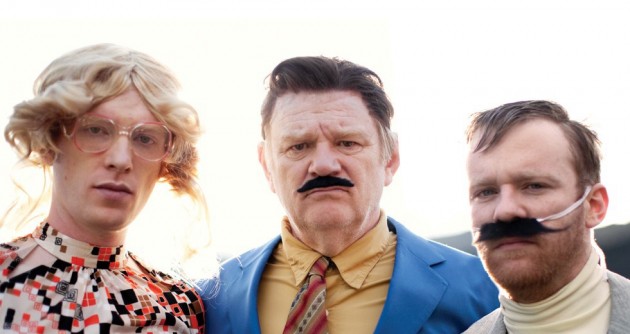‘It’s me.’
Delivered amid a melee of frazzled movement and chanting, these are the only two words spoken in the first ten minutes of Enda Walsh’s The Walworth Farce. As the script is built upon a play within a play in which the Gleeson men cover nine roles, this clever opening could not be more smug for a show that lives in a universe of rapidly changing identities.
Set in the dingy London flat of Corkian patriarch Dinny (Brendan) and sons Blake (Domhnall) and Sean (Brian), the show begins as the neurotic trio hastily set the stage of their decrepit lodgings with outlandish props and costumes. Milling about with wigs, sausages, shaved legs, and mild terror, each plays his part. The audience isn’t quite sure of the motivation behind these frenzied placements until without warning, a ribald performance, or farce, is born among the men. And no one is certain of the men’s relationships to one another until the action of their play abruptly stops so Dinny can correct his sons’ lines. With the boundaries in place, the point of their little play is clear. These men are reliving the canon history of their own family.
Like most families, these men tell the story of their past to gain a common truth among them which helps in understanding their present. It’s a story of jokes and heartache, fraternal love and hate, nostalgia and forward movement, the stuff that forges family bonds. Unlike most families, however, the story is a daily forced performance, held to the strictest degree of accuracy under the tyrannical eye of father Dinny. And what’s most striking: it is a lie.
As the performance unfolds, we learn that Dinny has conjured the tale with no detail untidy to conceal the bloody events that led to his flight from Cork. Only younger son Sean knows the play they perform day in and day out is a farcical mask for their family’s tragic dissolution. Yet Dinny violently keeps the young men in check. Having brainwashed them with the falsehood from childhood, Brendan Gleeson’s ferocious Dinny smacks their heads with pans and lashes belts in their faces when they step out of storyline. Soon we see that the farce making us laugh is actually the most horrific part of the narrative.
Walsh’s carefully constructed text is a brilliant exercise in metatheatre. Casting his characters as players of an endless circus of farcical horror, he invites his audience to think on how we as a society use, and possibly abuse, theatre. Are we reflecting on our state of being in a realm of artistic communication? Or are we manipulating our understanding of ourselves, turning truth into lies that are easier to process? Coupled with director Sean Foley’s lively staging, the fluid script runs seamlessly. Clearly defined boundaries between the show in the Olympia and the show in the men’s flat make the succession of scenes easy to follow. Yet the pace is so cleverly rapid that big laughs often spill over into moments of shocked silence, and vice versa. Stark lighting changes and wig removals become brake-slamming moments that return the men to their destitute reality, and the moments of hilarity are immediately transformed into moments of pity. Blake’s outrageous portrayal of various women in the story elicits unhinged laughter before the chills set in as we wonder just what kind of fatherly abuse he’s suffered.
The only weaker moments in narrative occur when outsider Hayley, played by debut actress Leona Allen, joins the pandemonium. A Tesco cashier befriended by Sean on his daily trips to buy the props, the young girl unwittingly enters a universe severely cut off from her own and thus becomes our point of reference, the audience ambassador to the stage. As the danger sets in on Hayley, our sense of the dire circumstances sinks in as we feel her life threatened. Yet Allen’s performance, while strong in itself, is out of step with the Gleeson rhythm established by the other three. True, casting a father and two sons as a father and two sons automatically invites a chemistry that is hard to breach. Still, Allen’s portrayal of a girl forced to play a sick game of house to save her life does not read as strongly as the two sons’ violent struggle to cope with isolation and abuse in all forms.
This show’s importance stems from the undeniable fact that it is timeless. Walworth Farce gives us the story of our most basic communal instinct, the family unit, and forces us to ponder how we can laugh and process circumstances that are very real but separate from our own. It is not just a play about a play, it comments on plays. It compels us to question the nobility of comedy, of farce, and how we use them to examine reality. At what point does comedy become a gruesome cover-up of tragic truths? At what point does empathy fail and give way to the next bout of laughter? All these thoughts and wonderings are packed intricately into the wild experience delivered by this spectacular performance. The question is which performance. Joe Madsen
The Walworth Farce runs until Sunday, February 8. Go here to buy tickets.





